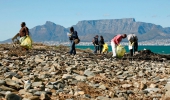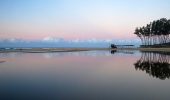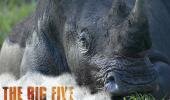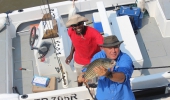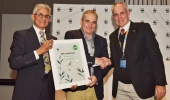Words: iSimangaliso Wetland Park Authority
World Rhino Day: Morning Live TOMORROW, SABC2, DSTV channel 404 - 22 September 2015 at 06h00.
As one of the continent’s most significant protected areas for the conservation of black and white rhino, the iSimangaliso Wetland Park with Ezemvelo KZN Wildlife have committed to making rhino security a priority to tackle the scourge of poaching that is threatening the global survival of this iconic species. Tomorrow – World Rhino Day – marks the culmination of several weeks of the largest community awareness campaign in the country. iSimangaliso together with the Department of Environmental Affairs (DEA) and nine other partner organisations, some 75 rural schools and over 11 000 learners have participated in a walk along the boundaries of the World Heritage Site. Representatives of the schools, Government, non-government organisations, conservation and business partners will join voices tomorrow to echo a massive shoutout to the world: “Not on our watch!” The team from South Africa’s prime breakfast show ‘Morning Live’ will be televising live from iSimangaliso with an address by our national Deputy Minister, Barbara Thomson and helping us spread our message far and wide.
According to DEA, “South Africa has a proud conservation record, having brought the rhino back from near extinction in the 1960s to a healthy estimated 20 000 black and white rhino by the end of 2013. Our country has been described as the only remaining hope for the world in terms of rhino conservation. It is a reputation that the country, and Government, wishes to maintain. The Government recognises that poaching is part of a multi-billion dollar worldwide illicit wildlife trade. Addressing the scourge is not simple. That is why we will continue to strengthen holistic and integrated interventions and explore new innovative options to ensure the long-term survival of the species.”
Bold steps to safeguard rhino
One of the pro-active steps recently taken by the iSimangaliso Wetland Park Authority and Ezemvelo KZN Wildlife (EKZNW) to deter poachers from targeting rhino in the World Heritage Site was a rhino de-horning programme throughout the Western Shores section of the Park.
The operation to de-horn the animals was conducted by EKZNW vet Dr Dave Cooper in collaboration with Dr Mike Kock and his team from the University of Pretoria – Faculty of Veterinary Science (Onderstepoort). The horn material was removed thereby rendering the rhino “valueless” to poachers.
According to Park CEO Andrew Zaloumis, “The iSimangaliso Wetland Park, like other conservation areas in northern KwaZulu Natal and Kruger National Park, has experienced an unprecedented surge in rhino poaching effort during the last 24 months – often with simultaneous multiple poaching incursions. In a considered response, and after in-depth discussion, reflection and specialist consultation, the iSimangaliso Authority together with our conservation partners EKZNW, is putting into place an additional suite of bold strategies and interventions to bolster rhino security in sections of the Park where they are most under threat and vulnerable to rhino poachers.”
Under special TOPS (Threatened or Protected Species) permits from the Department of Environmental Affairs, the de-horning of black and white rhino was undertaken in the Western Shores section of iSimangaliso. This 30,000ha section of the 220km long Park includes incorporated private forestry lands owned by Siyaqhubeka (Mondi).
The procedure, which can be likened to cutting a toenail without damaging the “quick”, takes approximately 20 minutes and is completely painless. Research has shown that provided the entire population is targeted there are no social side effects which may affect the rhino in the short or long-term. Dr Mike Knight, the Chairman of the IUCN African Rhino Specialist Group, as well as SADC Rhino Management Group, agreed that the method “remains a management option in high risk smaller populations.”
Says Tony Conway, EKZNW iSimangaliso Park Conservation Manager and Chairman of the KZN Rhino Management Group, “With the de-horning work complete, and the Western Shores “horn-free”, the rhino are now less vulnerable to poaching, able to roam freely and breed without being targeted for their horn.”
De-horning was used extensively in Namibia and Zimbabwe during the 1990s and more recently in small populations in South Africa, especially in the private sector and also in other SADC countries and East Africa. Namibia has again commenced with an extensive de-horning operation. Coupled with significant increases in funding and anti-poaching effort for rhino protection, de-horning is believed to have contributed significantly to reducing losses to poaching in many parts of Africa. It was for this reason, in light of the increased threat to rhino in KZN (over 250 rhino killed by poachers in the last two and a half years in KwaZulu-Natal), that iSimangaliso actioned this initiative.
Educational information is being made available to visitors and local tour and accommodation operators, as well as ongoing workshops with neighbouring communities. Zaloumis says that “The support of conservation-minded local communities has led to significant victories in the struggle against rhino poaching around the Park. iSimangaliso and EKZNW will continue to consider all developing strategies that work towards the stopping of this onslaught against defenceless animals and South Africa’s natural heritage. Removing the Western Shores rhinos’ horns has now given them a better chance of survival.”
Biodiversity Fact Box
Contemporary studies contend that the Earth has lost over half of its wildlife over the past 40 years. When iSimangaliso was listed as SA’s first World Heritage Site, 180 countries concurred that the iSimangaliso Wetland Park is a place of global significance. Over 6500 plant and animal species are known to occur in the iSimangaliso Wetland Park World Heritage site including: 526 bird species (25% of Africa’s bird population); 467 species which are listed as threatened in South Africa including rhino and turtles; and 11 endemic species (that is, the Park is the only place in the world in which these species occur).
For more information on the iSimangaliso Wetland Park, follow us on Twitter, Instagram, Facebook and Youtube, or visit our website at www.isimangaliso.com. Add your voice to our social media campaign using the hash tags #iSimangaliso4Rhinos and #notonourwatch.

